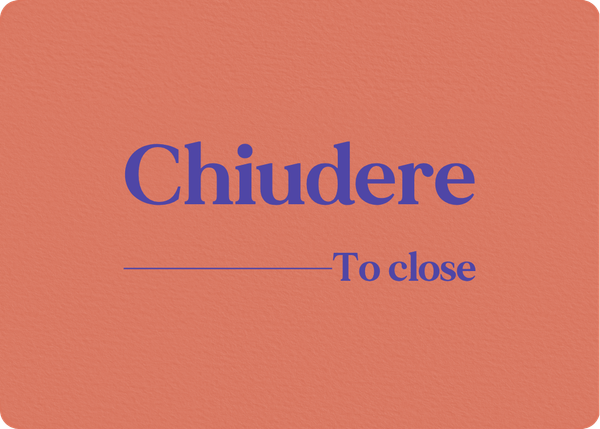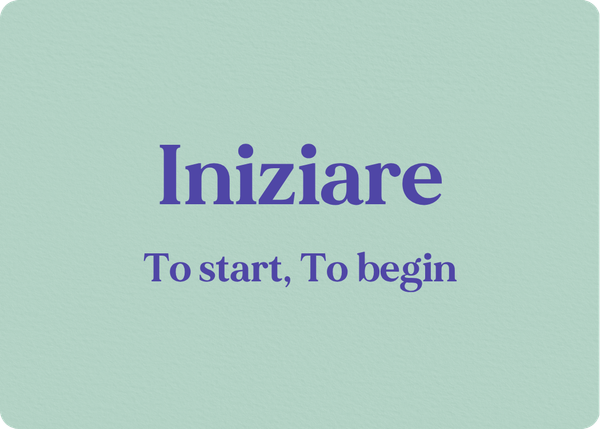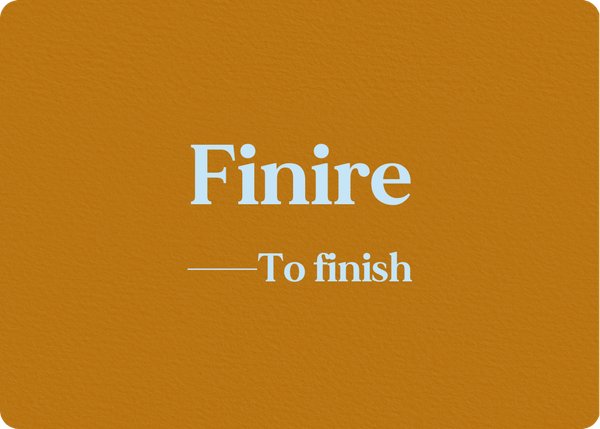What is Chiudere?
Chiudere is an Italian verb meaning "to close", "to shut", or "to lock". It belongs to the second conjugation (-ERE verbs) and is irregular in some tenses. This verb is useful for expressing everyday conversation, from describing closing doors and windows to expressing the ending of activities, businesses, and relationships.
Key Features of Chiudere:
- Type: Irregular second conjugation verb (-ERE)
- Meaning: To close, to shut, to lock, to end
- Irregularities: Simple past (chiusi, etc.), past participle (chiuso)
- Auxiliary verb: Uses "avere" (to have) for conjugation in compound tenses
- Past participle: Chiuso
Indicativo – Indicative Mood
Presente (Present Tense)
| Persona | Coniugazione |
|---|---|
| io | chiudo |
| tu | chiudi |
| lui/lei | chiude |
| noi | chiudiamo |
| voi | chiudete |
| loro | chiudono |
Example:
Chiudo sempre la porta a chiave.
I always lock the door.
Passato Prossimo (Present Perfect)
| Persona | Coniugazione |
|---|---|
| io | ho chiuso |
| tu | hai chiuso |
| lui/lei | ha chiuso |
| noi | abbiamo chiuso |
| voi | avete chiuso |
| loro | hanno chiuso |
Example:
Abbiamo chiuso la discussione dopo molte ore.
We ended the discussion after many hours.
Imperfetto (Imperfect)
| Persona | Coniugazione |
|---|---|
| io | chiudevo |
| tu | chiudevi |
| lui/lei | chiudeva |
| noi | chiudevamo |
| voi | chiudevate |
| loro | chiudevano |
Example:
Da bambino chiudevo sempre gli occhi durante i film horror.
As a child I always closed my eyes during horror movies.
Trapassato Prossimo (Past Perfect)
| Persona | Coniugazione |
|---|---|
| io | avevo chiuso |
| tu | avevi chiuso |
| lui/lei | aveva chiuso |
| noi | avevamo chiuso |
| voi | avevate chiuso |
| loro | avevano chiuso |
Example:
Avevamo già chiuso l'accordo prima della riunione.
We had already closed the agreement before the meeting.
Passato Remoto (Simple Past)
| Persona | Coniugazione |
|---|---|
| io | chiusi |
| tu | chiudesti |
| lui/lei | chiuse |
| noi | chiudemmo |
| voi | chiudeste |
| loro | chiusero |
Example:
Il negozio chiuse definitivamente nel 1990.
The shop closed permanently in 1990.
Trapassato Remoto (Past Anterior)
| Persona | Coniugazione |
|---|---|
| io | ebbi chiuso |
| tu | avesti chiuso |
| lui/lei | ebbe chiuso |
| noi | avemmo chiuso |
| voi | aveste chiuso |
| loro | ebbero chiuso |
Example:
Dopo che ebbe chiuso la porta, sentì un rumore strano.
After he had closed the door, he heard a strange noise.
Futuro Semplice (Simple Future)
| Persona | Coniugazione |
|---|---|
| io | chiuderò |
| tu | chiuderai |
| lui/lei | chiuderà |
| noi | chiuderemo |
| voi | chiuderete |
| loro | chiuderanno |
Example:
Chiuderemo l'affare entro venerdì.
We will close the deal by Friday.
Futuro Anteriore (Future Perfect)
| Persona | Coniugazione |
|---|---|
| io | avrò chiuso |
| tu | avrai chiuso |
| lui/lei | avrà chiuso |
| noi | avremo chiuso |
| voi | avrete chiuso |
| loro | avranno chiuso |
Example:
Avranno chiuso la strada a causa dell'incidente.
They must have closed the road because of the accident.
Congiuntivo – Subjunctive Mood
Presente (Present Subjunctive)
| Persona | Coniugazione |
|---|---|
| che io | chiuda |
| che tu | chiuda |
| che lui/lei | chiuda |
| che noi | chiudiamo |
| che voi | chiudiate |
| che loro | chiudano |
Example:
È probabile che chiudano per ferie ad agosto.
It's likely they'll close for vacation in August.
Passato (Past Subjunctive)
| Persona | Coniugazione |
|---|---|
| che io | abbia chiuso |
| che tu | abbia chiuso |
| che lui/lei | abbia chiuso |
| che noi | abbiamo chiuso |
| che voi | abbiate chiuso |
| che loro | abbiano chiuso |
Example:
Credo che abbiano chiuso il museo per restauri.
I believe they closed the museum for renovations.
Imperfetto (Imperfect Subjunctive)
| Persona | Coniugazione |
|---|---|
| che io | chiudessi |
| che tu | chiudessi |
| che lui/lei | chiudesse |
| che noi | chiudessimo |
| che voi | chiudeste |
| che loro | chiudessero |
Example:
Credevo che il museo chiudesse alle 8.
I thought the museum closed at 8.
Trapassato (Past Perfect Subjunctive)
| Persona | Coniugazione |
|---|---|
| che io | avessi chiuso |
| che tu | avessi chiuso |
| che lui/lei | avesse chiuso |
| che noi | avessimo chiuso |
| che voi | aveste chiuso |
| che loro | avessero chiuso |
Example:
Se aveste chiuso bene la porta, il gatto non sarebbe scappato.
If you had closed the door properly, the cat wouldn't have escaped.
Condizionale – Conditional Mood
Presente (Present Conditional)
| Persona | Coniugazione |
|---|---|
| io | chiuderei |
| tu | chiuderesti |
| lui/lei | chiuderebbe |
| noi | chiuderemmo |
| voi | chiudereste |
| loro | chiuderebbero |
Example:
Chiudereste un occhio per questo errore?
Would you turn a blind eye to this mistake?
Passato (Past Conditional)
| Persona | Coniugazione |
|---|---|
| io | avrei chiuso |
| tu | avresti chiuso |
| lui/lei | avrebbe chiuso |
| noi | avremmo chiuso |
| voi | avreste chiuso |
| loro | avrebbero chiuso |
Example:
Non avremmo mai chiuso l'affare senza la tua approvazione.
We never would’ve closed the deal without your approval.
Imperativo (Imperative)
| Persona | Coniugazione |
|---|---|
| (tu) | chiudi |
| (lui/lei) | chiuda |
| (noi) | chiudiamo |
| (voi) | chiudete |
| (loro) | chiudano |
Example:
Chiudi il rubinetto, stai sprecando acqua!
Turn off the tap, you're wasting water!
Indefinite Moods
Infinito (Infinitive)
- Presente (Present): chiudere (to close)
- Passato (Past): avere chiuso (to have closed)
Examples:
Dobbiamo chiudere il conto in banca.
We have to close the bank account.
Dopo aver(e) chiuso la discussione, si sentì sollevato.
After closing the discussion, he felt relieved.
Participio (Participle)
- Passato (Past): chiuso (closed) - also used as adjective
Example:
È un capitolo chiuso della mia vita.
It's a closed chapter of my life.
Gerundio (Gerund)
- Presente (Present): chiudendo (closing)
- Passato (Past): avendo chiuso (having closed)
Examples:
Chiudendo la valigia, ho rotto la cerniera.
Closing the suitcase, I broke the zipper.
Avendo chiuso con il passato, guardò al futuro.
Having closed with the past, he looked to the future.
The verb Chiudere at a glance: Key tenses you need
| Present | Present Perfect | Imperfect | Present Subjunctive | Imperfect Subjunctive | Present Conditional |
|---|---|---|---|---|---|
| io chiudo | io ho chiuso | io chiudevo | che io chiuda | che io chiudessi | io chiuderei |
| tu chiudi | tu hai chiuso | tu chiudevi | che tu chiuda | che tu chiudessi | tu chiuderesti |
| lui/lei chiude | lui/lei ha chiuso | lui/lei chiudeva | che lui/lei chiuda | che lui/lei chiudesse | lui/lei chiuderebbe |
| noi chiudiamo | noi abbiamo chiuso | noi chiudevamo | che noi chiudiamo | che noi chiudessimo | noi chiuderemmo |
| voi chiudete | voi avete chiuso | voi chiudevate | che voi chiudiate | che voi chiudeste | voi chiudereste |
| loro chiudono | loro hanno chiuso | loro chiudevano | che loro chiudano | che loro chiudessero | loro chiuderebbero |
Conclusion
Mastering the conjugation of "chiudere" is essential for expressing closing, shutting, and ending in Italian. As an irregular second conjugation verb, it requires attention to its irregular forms.
Remember the key points:
- Uses "avere" as auxiliary verb in compound tenses
- Irregular in simple past and past participle
- Past participle is "chiuso"
- Essential for describing closing doors, windows, businesses, and ending activities
- The opposite verb is "aprire" (to open)
Keep practicing with real sentences and contextual examples to master this Italian verb!





